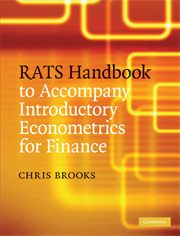Book contents
- Frontmatter
- Contents
- List of figures
- List of screenshots
- Preface
- 1 Introduction
- 2 The classical linear regression model
- 3 Further development and analysis of the classical linear regression model
- 4 Diagnostic testing
- 5 Formulating and estimating ARMA models
- 6 Multivariate models
- 7 Modelling long-run relationships
- 8 Modelling volatility and correlation
- 9 Switching models
- 10 Panel data
- 11 Limited dependent variable models
- 12 Simulation methods
- Appendix: sources of data in this book
- References
- Index
9 - Switching models
Published online by Cambridge University Press: 05 June 2012
- Frontmatter
- Contents
- List of figures
- List of screenshots
- Preface
- 1 Introduction
- 2 The classical linear regression model
- 3 Further development and analysis of the classical linear regression model
- 4 Diagnostic testing
- 5 Formulating and estimating ARMA models
- 6 Multivariate models
- 7 Modelling long-run relationships
- 8 Modelling volatility and correlation
- 9 Switching models
- 10 Panel data
- 11 Limited dependent variable models
- 12 Simulation methods
- Appendix: sources of data in this book
- References
- Index
Summary
Dummy variables for seasonality
In the context of financial markets, and especially in the case of equities, a number of ‘seasonal effects’ have been noted. Such effects are usually known as ‘calendar anomalies’ or ‘calendar effects’ and result in systematically different behaviour in one or more seasons compared with the others. Examples include open- and close-of-market effects, the ‘January effect’, weekend effects and bank holiday effects.
One very simple method for coping with this and examining the degree to which seasonality is present is the inclusion of dummy variables in regression equations. The number of dummy variables that could sensibly be constructed to model the seasonality would depend on the frequency of the data. For example, four dummy variables would be created for quarterly data, twelve for monthly data, five for daily data and so on. In the case of quarterly data, the four dummy variables would be defined as follows:
D1t = 1 in quarter 1 and zero otherwise
D2t = 1 in quarter 2 and zero otherwise
D3t = 1 in quarter 3 and zero otherwise
D4t = 1 in quarter 4 and zero otherwise
It is important to remember that if an intercept term is used in the regression, the number of dummies that could also be included would be one less than the ‘seasonality’ of the data. So for quarterly data, we could either use four dummy variables and no intercept or three dummies and an intercept to avoid falling into the ‘dummy variable trap’.
Information
- Type
- Chapter
- Information
- RATS Handbook to Accompany Introductory Econometrics for Finance , pp. 145 - 159Publisher: Cambridge University PressPrint publication year: 2008
